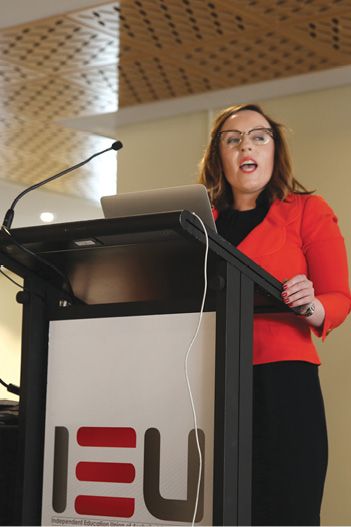More than 130 women enjoyed an inspiring day which gave them an opportunity to renew their energies and take stock at this Year’s IEU Women’s Conference, Women, Work and the Wider World on 19 August.
The conference was registered for five hours accreditation with BOSTES.
The day was launched with welcomes and opening addresses by IEU President Christine Wilkinson and IEU Assistant Secretary Pam Smith.
Pam paid tribute to the IEU’s Women and Equity Committee, which works to make sure all workplaces are safe and fair. She said the committee had worked hard all year suggesting ideas and speakers for the conference. Any member interested in joining should email franca@ieu.asn.au.
In his opening address IEU Secretary John Quessy noted that women are suffering from a new form of discrimination: cyberbullying and trolling.
“I fear that we, as teachers and carers of young people, still have much to teach young people, particularly young women, about online safety and self protection. More importantly, we have so very much more to teach young men about respect and about fundamental human dignity and about what it means to be part of a truly civilised society,” John said.
Keynote speaker Dr Sheree Gregory outlined her in depth research into the status of women in the workplace.
Dr Gregory noted that while on the face of it women’s lives have changed significantly in the last few decades, many entrenched cultural norms about gender roles persisted.
“Do women really have more choice? The devaluing of caring underpins the unequal status of women,” Dr Gregory said.
The gender pay divide had in fact grown bigger in recent years, she said.
Real changes to women’s lives must include changes to the way households are organised, a change in attitude in society in general and more government support of childcare.
Keynote speaker Assoc Professor Pep Serow told a fascinating story about her work with the University of New England training the teachers of Nauru.
The inhabitants of the tiny island live on its coastal fringe, because the interior has been destroyed by phosphate mining done by western business interests.
The inhabitants cannot grow fresh food and rely on things like imported Spam and two minute noodles.
Not surprisingly, there are very high rates of diabetes and obesity on the island.
The university has been running teacher training for Nauruan teachers since 2011 after winning a federal government contract.
Serow said the teachers, who received extremely poor pay, and could earn better money working as cleaners at the detention centre, were thrilled with the training they received from Australia.
She said the training aimed to make the best use of limited resources, such as using seeds and shells for counting in maths, and incorporated the local culture in the teaching style and curriculums.
“We want to empower the local teachers and reduce the number of expat teachers working on the island,” Serow said.
Delegates enjoyed a number of workshops such as Enhancing Positive Workplace Relations with psychologist Debbie Walker on what makes a workplace run smoothly.
Keeping Aboriginal and Torres Strait Islander Issues on the Agenda with IEU Organiser Marilyn Jervis examined issues impacting Aboriginal and Torres Strait islander people and their relevance to Australian Teaching Standards 1.4 and 2.4.
The Supporting Student Wellbeing workshop with Awaken Youth Director Donna Redman provided an overview of strategies to assist teachers and support staff to understand the risks and warning signs of students regarding self harm and suicide.
Women and Money with NGS Super provided a detailed examination of how IEU female members are tracking towards retirement. Teachers Healthcare provided Tools to Manage a Health Work/Life Balance, taking a holistic approach to well being.
What do I need to Know on Teacher Accreditation with IEU Professional Officers Amy Cotton and Elizabeth Finlay provided useful information on the requirements of accreditation in NSW.



































































































































